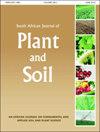Yield, nutritional composition, and consumer acceptability of sweetpotato cultivars cultivated with soil amendments in the Middleveld of Eswatini
IF 0.7
Q3 AGRONOMY
引用次数: 0
Abstract
Uncertainties about the effects of nutrient amendment on the culinary attributes of sweetpotato have limited fertiliser use in Eswatini. The study was carried out at a moist and dry location of Eswatini to investigate the culinary and nutritional attributes of sweetpotato cultivated with no amendments, cattle manure and/or inorganic fertiliser. Treatments were replicated three times in a 3 × 5 factorial arrangement using a randomised complete block design. Three sweetpotato varieties used: Ligwalagwala, Kenya White, and Lamngititi, with five nutrient amendments: no fertiliser/manure, 450 kg ha−1 NPK, 6 t ha−1 manure, 3 t ha−1 manure + 225 kg ha−1 NPK, and 4.5 t ha−1 manure + 112.5 kg ha−1 NPK. Yield differences of 59.8% and 47.3% over the control were recorded with Kenya White and 3 t ha−1 manure + 225 kg ha−1 NPK, and 4.5 t ha−1 manure + 112.5 kg ha−1 NPK at Malkerns and Luve, respectively. Protein, calcium, and magnesium content of the varieties improved under 4.5 t ha−1 manure + 112.5 kg ha−1 NPK amendments. Taste, flavour, palatability, and acceptability accounted for the greatest amount of culinary variability while soil amendments contributed the least. The present study suggests that nutrient amendments contribute to the agronomic performance and nutritional quality of sweetpotato.斯威士兰中部用土壤改良剂培育的甘薯品种的产量、营养成分和消费者可接受性
营养改良对红薯烹饪特性影响的不确定性限制了斯威士兰的化肥使用。这项研究是在斯威士兰潮湿干燥的地方进行的,目的是调查不添加改良剂、牛粪和/或无机肥料种植的红薯的烹饪和营养特性。在3 × 使用随机完全区组设计的5因子排列。使用的三个红薯品种:Ligwalagwala、Kenya White和Lamngtiti,有五种营养改良剂:无肥料/粪肥,450 kg ha−1 NPK,6 t ha−1粪肥,3 t ha−一粪肥 + 225 kg ha−1 NPK和4.5 t ha−1粪肥 + 112.5 kg ha−1 NPK。与对照相比,肯尼亚白和3 t ha−1肥料的产量差异分别为59.8%和47.3% + 225 kg ha−1 NPK和4.5 t ha−1粪肥 + 112.5 kg ha−1 NPK。施用4.5t ha−1肥料后,改良品种的蛋白质、钙和镁含量 + 112.5 kg ha−1 NPK修正案。味道、风味、适口性和可接受性是烹饪变化最大的原因,而土壤改良剂的影响最小。本研究表明,营养改良有助于甘薯的农艺性状和营养品质。
本文章由计算机程序翻译,如有差异,请以英文原文为准。
求助全文
约1分钟内获得全文
求助全文
来源期刊

South African Journal of Plant and Soil
Agricultural and Biological Sciences-Plant Science
CiteScore
1.90
自引率
11.10%
发文量
32
期刊介绍:
The Journal has a proud history of publishing quality papers in the fields of applied plant and soil sciences and has, since its inception, recorded a vast body of scientific information with particular reference to South Africa.
 求助内容:
求助内容: 应助结果提醒方式:
应助结果提醒方式:


